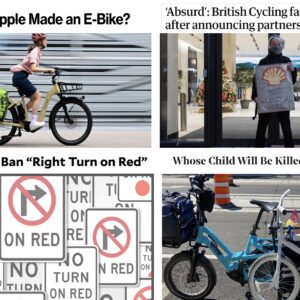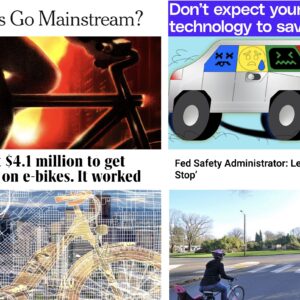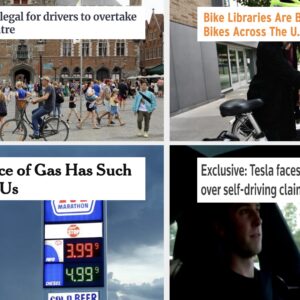Cars and money, bikes and public health, London bikesharing snag, why do cities work, how can cities work better, Barcelona before the car.
This week in the world of bikes and beyond:
– President Obama is digging deep into the U.S. auto industry crisis. His plan includes tax incentives for people who buy new cars.
– A new study found that on average, if an Arizona household paid off all of its transportation expenses before any other spending, starting at the beginning of the year, they would be in the clear on March 23rd — that’s nearly three months worth of income.
– Plans for a bikesharing program in London have hit a snag as the Mayor has decided to forbid anyone locking the bikes up anywhere but the official docking stations. Local bike advocates have not yet convinced him that this rule would increase bike theft and prevent people from actually using the bikes as intended, for short trips.
– April’s American Journal of Public Health cover features a street full of bikes in Copenhagen taken on Carfree Day in 2005. AJPH editorializes about the cover: “The United States can benefit from ideas and initiatives around the globe in reforming health.”
– A thoughtful comparison in the New York Times of the emergence of Wikipedia to the genesis of cities, invoking Lewis Mumford and Jane Jacobs, poses the question of how these behemoths can work at all, much less well.
– Also in the Times, a call for rethinking the design of cities in a post-Cold War, post-Reagan, “post-Kyoto” era. Case studies of New Orleans, L.A., the Bronx, and Buffalo, including some good planning history.
– For inspiration: a video of Barcelona in 1908, sans cars.
As always, add your own links, ideas, and analysis in the comments.







Thanks for reading.
BikePortland has served this community with independent community journalism since 2005. We rely on subscriptions from readers like you to survive. Your financial support is vital in keeping this valuable resource alive and well.
Please subscribe today to strengthen and expand our work.
Umm, isn’t that just a really roundabout way of saying Arizonans spend about 25% of their money on transportation?
Your review of the Times article about Wikipedia misses the point, or at least your apparent analysis varies with what Cohen actually says. Mr. Cohen’s review seems to say that Wikipedia and cities work primarily through the unfettered contributions of thousands, in the case of cities, millions, of non-experts. Regardless of whether you agree with that or not, the article seems to say that the future for both Wikipedia and cities is strong.
To put it in a way that perhaps works well on this site, if we let ordinary citizens, bicyclists and drivers alike, determine the best ways to accommodate each others needs, we would be farther ahead than when we entrust it to engineers and political experts. Perhaps the I-5 bridge is a case in point?
Dave — yep, but I assume it’s put that way to drive the point home in a new way.
Mark — I agree with your reading of the article, and wasn’t trying to editorialize about it one way or another — just to depict the question the article sets out to tackle. I’ll try to think of a way to rephrase it.
That Barcelona video is an awesome find. The way those guys navigate trolley tracks is pretty impressive in itself.
Mark, I highly recommend that you read The Starfish and the Spider. The book examines the development of self-organizing systems like wikipedia, cragslist, and how the Apache held off the Spanish for two centuries.
No earth shattering revelations, but it is a thoughtful discourse on the strength of the self-organized. If you cut a spider in half, you have dead spider. If you cut a starfish in half, you have two starfish. The difference is in how they are organized.
And there are many street films in cities around the world by Thomas Edison:
http://www.youtube.com/watch?v=6waHQwR0G4k
That no-lock policy in London just strikes me as SO foolish and unpractical…seriously, has this person ever owned and actively commuted on a bike? Really??
Coyote #5, good work.
So I logged into the library website, and searched on the book. There are 2 holds on it already, and yet the book is sitting on the shelf, so that means those 2 holds were placed today, probably both within the last hour… (There are now 3 holds on it.)
well, mark 5, bicyclists and drivers cannot just up and “decide” to build a bridge, they need engineers and politicians to get it done. the problem becomes that ordinary folk then simply entrust all decisionmaking to “experts” and cease to inform themselves or participate in the process at all.
There is no way I spend 3 months salary on car related stuff. (And it’s not like I make that much!) I spend MAYBE 50$ a month on Gas, and 120 a year on oil changes.
So, how will the no-lock policy be enforced?
The article mentions that they will cut off locks that they find.
I would challenge that with the latest U-Bolt locks that are next to impossible to cut.
Will they be cruising London with welding torches for the sole purpose of cutting off locks and melting bikes and racks in the meantimes?
I can see an easy and fun protest. Get some really cheap junk bikes and some heavy u-bold locks and start locking them up.
Now, take that back. Find some bikes with magnesium frames. Lock them up. Let them take their welding torches and try to cut the locks.
Poof! The magnesium goes up.
And as any of you know who has dealt with a magnesium fire. You just can’t put those out! Just try to douse it with water! The fire burns so hot that it splits the oxygen and hydrogen atoms apart from the water molicules and then they burn! Nasty stuff!
Mark
anonymous..your car is used and old then (older than the typical 60 month car loan?)….and from your post I could assume you’re driving illegally and without insurance?
Anonymous – Your calculation of your auto costs is typical of the American motorist. You cite only your out of pocket costs for gas and oil. My costs for driving my 17-year old car about 3000 miles per year consist of about $400 in gas, $30 for an oil change, $27 for annual registration, $21 every two years for DEQ, and almost $300 in insurance. And every once in a while, I have a repair bill of a few hundred.
Ah, you guys are right, I did not consider insurance or registration fees. Even with that, it doesn’t come near to 25 percent of my salary. My car is 2001 and it was given to me, so I am lucky there. I drive less than 3000 miles a year.
Anyway, so for a rough estimated cost: 50@ per month for gas x 12 months = 600 dollars. Oil changes 4 x a year at 30 bucks a pop = 120. 27 for annual registration (I’m taking your number there), 21 (You say every two years, but I am going to calculate it at one year cause I seem to remember it being more than that) plus roughly 720 a year for insurance. That’s a total of 1488 a year.
Granted, I was lucky at getting the car for free, and the fact that it’s never had any problems. The only parts I’ve had to change are lightbulbs and those are negligble. So I guess what I’m saying is that I think the 3 months salary thing is a bit off. My family has always owned their cars for a long time, and I wouldn’t pay interest on it, so first cost would come in between 1k-1.5k per year too.
So basically, I practically spend more a month buying locally grown groceries than I do on my car. I definitely spend more on my mortgage for my small, close in house. I spend more on basic utilities than I do my car. (And no, I’m not a fatrear who sits around watching tv and eating a ton!)
I realize I made a mistake, but thanks for the snark. It’s always helpful.
Coyote 5, thanks for the recommendation. are 9, I’m not sure you are referring to me or “Coyote.” If me, my point is not that non-experts can or should actually execute projects like bridges. However, the non-experts are generally prepared to develop the criteria and requirements even if it takes professionals to organize those requirements for politicians to seek funding and engineers to develop plans. As an example, when engineers and politicians create things like NE Broadway St and Weidler in Portland as one-way couplets, you have something that doesn’t work as a street, but as a highway.
In regards to transportation costs. I think it would be fair to include the taxes you pay (property, income, sales) that cover road expenses. (And good luck finding that number).
Also consider what portion of your grocery bill is used to pay the Grocer’s and Truckers taxes. Taxes that are used to build our roads.
I meant to write, “the portion” of your taxes. Sorry.
Brian – I understand your thought, but wouldn’t those transportation costs also apply to cyclists? Since this is a bike board and the article was mainly about car or transit use, I was looking at the difference between owning a car and biking.
Brian: took the words out of my mouth. It was sad reading the comment on the AZ blog saying that “gas taxes pay for building roads.” They don’t, entirely. The US has been deficit-spending the federal transportation budget since 2001, and states keep people employed by making sure their allocations are spent before renewal deadlines.
Judging by the auto bailout reports, we can probably also include the taxes spent to keep American auto makers afloat and subsidize new vehicle purchases.
Anonymous (#18): yes, sadly, you’re correct. Individual cost-of-ownership wouldn’t include that burden (that we all share, unless, of course, you believe comments on Oregonlive).